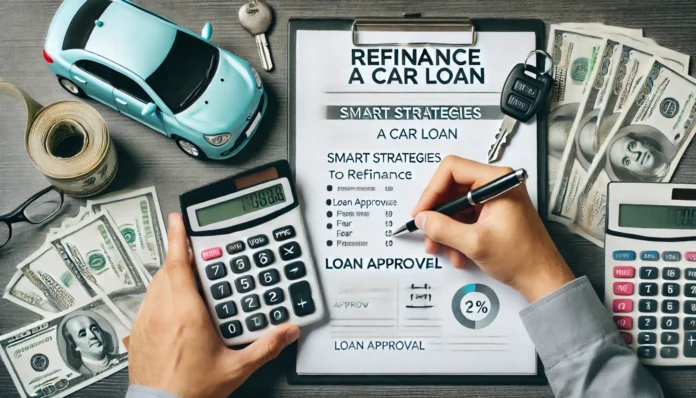Understanding the Importance of Refinancing a Car Loan
Refinancing a car loan can be an effective way to reduce financial strain, lower interest rates, and improve overall loan terms. Many vehicle owners initially secure auto loans with less-than-ideal interest rates due to credit limitations, unfavorable market conditions, or dealer-arranged financing. However, as financial situations improve, refinancing a car loan presents an opportunity to secure better rates and repayment conditions. By leveraging an auto loan refinance, borrowers can significantly decrease the total cost of their vehicle financing and free up funds for other financial obligations.
You may also like: Best Student Loan Refinance Options in 2025: Compare Rates & Save Thousands
Auto refinancing allows borrowers to replace their existing car loan with a new loan from a different lender, typically at a lower interest rate. This process can lead to substantial savings over the life of the loan, making it a valuable financial strategy. Additionally, refinancing can extend repayment periods, reducing monthly payments and improving financial flexibility. However, understanding the best way to refinance a car requires careful analysis of factors such as creditworthiness, current interest rates, and lender options.

Key Benefits of Refinancing an Auto Loan
One of the primary advantages of auto refinancing is the potential for lower interest rates. Car owners who initially took out loans with high interest rates due to poor credit may find significantly better offers as their credit scores improve. Refinancing a car loan with a lower rate translates into lower monthly payments and less overall interest paid during the loan term.
Beyond reducing interest costs, auto loan refinancing offers borrowers improved financial flexibility. Lower monthly payments provide greater cash flow, which can be allocated toward other financial goals, such as savings, investments, or debt repayment. For borrowers experiencing financial hardship, extending the loan term can also reduce monthly expenses, although this approach may result in higher overall interest costs.
Another critical benefit of refinancing is the potential to remove cosigners from an existing loan. Many borrowers require a cosigner to qualify for a car loan initially, but refinancing into a new loan under their name alone allows them to assume full responsibility while freeing their cosigners from financial liability.
How to Determine the Right Time for Auto Refinancing
Choosing the optimal moment to refinance a car loan requires assessing several key factors. One of the most important considerations is the current interest rate environment. Borrowers should compare auto refinancing rates to ensure that refinancing provides meaningful savings. Tracking market trends and evaluating the standard auto refinancing rate right now helps in making informed decisions.
Credit score improvements also play a significant role in determining eligibility for better refinancing terms. Borrowers who have consistently made on-time payments and reduced their overall debt levels since obtaining their original auto loans may qualify for significantly lower interest rates. Checking credit reports and understanding how credit scores impact refinancing options is crucial.
Additionally, evaluating the remaining balance on an auto loan helps determine whether refinancing makes financial sense. If a loan is nearly paid off, refinancing may not provide enough savings to justify the process. However, for borrowers with substantial loan balances, refinancing offers significant cost-cutting opportunities.
Selecting the Best Auto Refinance Companies
Finding the best auto refinance companies requires careful research and comparison. Various financial institutions, including banks, credit unions, and online lenders, offer auto loan refinancing options. Each lender has different qualification criteria, interest rate structures, and loan terms.
Online lenders often provide quick application processes and competitive rates, making them a popular choice for vehicle refinancing. Credit unions, on the other hand, tend to offer lower rates and personalized customer service, particularly for members with strong credit histories. Banks that specialize in auto financing also provide refinancing options with flexible terms.
When selecting a lender, it is essential to compare rates for refinancing auto loans, fees, and loan terms. Some lenders charge origination fees, prepayment penalties, or other hidden costs that can diminish the benefits of refinancing. By carefully reviewing all associated expenses, borrowers can ensure they are securing the best possible deal.
Steps to Refinance a Car Loan Successfully
The process of refinancing a car loan involves several essential steps. The first step is gathering necessary financial documents, including income verification, credit reports, and details of the existing auto loan. Having all required paperwork prepared helps streamline the refinancing application process.
Next, borrowers should use a refinance auto loan calculator to estimate potential savings and determine whether refinancing aligns with their financial goals. These calculators allow borrowers to compare different loan scenarios, factoring in new interest rates and loan terms to assess overall cost reductions.
Once borrowers identify the best refinance car loan options, submitting applications to multiple lenders ensures competitive rate comparisons. Many lenders offer pre-approval, which allows borrowers to see estimated rates without impacting their credit scores. Reviewing multiple offers before committing to a specific refinancing option helps maximize savings.
After selecting a refinancing offer, borrowers must complete the application process, undergo credit evaluations, and finalize loan terms with the new lender. Once approved, the new lender pays off the existing car loan, and borrowers begin making payments under the new refinancing terms.
Common Mistakes to Avoid When Refinancing a Car Loan
While refinancing can provide financial benefits, several common mistakes should be avoided to ensure a successful outcome. One mistake is refinancing too early, before sufficient credit score improvements have occurred. Borrowers should ensure their creditworthiness has improved enough to qualify for significantly lower rates before proceeding.
Another mistake is extending the loan term excessively. While longer loan terms reduce monthly payments, they also increase the total interest paid over time. Borrowers should balance affordability with minimizing interest costs when selecting loan terms.
Failing to compare multiple lenders is another common pitfall. Some borrowers accept the first refinancing offer they receive without exploring alternatives. Comparing offers from different auto refinance companies ensures the best possible rates and terms.

Frequently Asked Questions (FAQ) on Auto Loan Refinancing
1. What are the benefits of refinancing a car loan? Refinancing a car loan can help lower monthly payments, secure a better interest rate, or adjust the loan term to better fit your financial goals. Many borrowers choose auto loan refinance options to reduce their interest burden, which can lead to significant savings over the life of the loan. If your credit score has improved since you first financed the vehicle, you may qualify for better auto refinancing rates. Additionally, refinancing car loans can provide flexibility, such as switching from a variable to a fixed-rate loan. Before committing, it’s important to compare rates for refinancing auto loans to ensure you’re making the best financial decision.
2. When is the best time to refinance an auto loan? The best time to refinance a car loan is when interest rates have dropped, your credit score has improved, or you need to adjust your monthly payments. Checking auto loan rates refinance options regularly can help you identify favorable conditions. If you find that used car refinance rates have decreased significantly compared to when you initially financed the vehicle, it may be a good time to refinance. Additionally, if your financial situation has changed—such as an increase in income or a shift in expenses—auto refinancing can help you better manage your budget. Using a refinance auto loan calculator can help determine potential savings before applying.
3. What factors determine car refinancing rates? Car refinancing rates are influenced by factors such as credit score, loan-to-value ratio, loan term, and current market conditions. Borrowers with excellent credit scores typically qualify for the best auto refinance rates. Additionally, lenders assess the age and mileage of the vehicle, as well as the remaining balance on the loan. Shopping with the best auto refinance companies can help secure lower rates by comparing multiple lenders. It’s important to evaluate the best refinance car loan options available to ensure you are getting competitive terms.
4. Where can I refinance my car loan? Many financial institutions offer car refinance options, including banks, credit unions, and online auto refinance companies. Banks that refinance home loans often provide vehicle refinancing services as well, offering competitive rates to their existing customers. Some of the best car refinance companies specialize in refinancing auto loans with streamlined online applications and fast approval processes. Additionally, online refinance mortgage loan providers sometimes offer bundled refinancing options that include vehicle refinance opportunities. Comparing multiple lenders can help you determine the best place to refinance based on your financial situation.
5. How can I refinance my car loan if my credit has improved? If your credit score has improved since taking out your original auto loan, refinancing can help you secure better terms. Start by checking the best way to refinance a car through lenders offering competitive rates and flexible terms. The best home refinance mortgage lenders sometimes provide vehicle refinancing, allowing borrowers to work with a trusted institution. Prequalifying with multiple lenders can help you compare auto refinancing rates without affecting your credit score. Once approved, ensure you understand the terms before finalizing your new loan agreement.
6. What are the risks of auto loan refinancing? While auto refinancing can offer financial benefits, there are some risks to consider. Extending your loan term to reduce monthly payments may result in paying more interest over time. Some lenders charge fees for refinancing car loans, which can negate potential savings. Additionally, if your vehicle has significantly depreciated, you may not qualify for the best refinance loans. It’s important to use a refinance auto loan calculator to assess whether refinancing is a cost-effective decision. Researching the best refinance companies can help mitigate potential risks and ensure you get the best deal possible.
7. How does a car refinance pre-approval process work? Car refinance pre-approval allows borrowers to see potential rates and loan terms before formally applying. Many auto refinance companies offer pre-qualification tools that perform a soft credit check, allowing you to compare offers without impacting your credit score. Once pre-approved, you can explore different vehicle refinancing options and choose the best one for your financial needs. Understanding the process before finalizing your loan ensures that you secure the best refinance car loan without unnecessary fees. The pre-approval step also provides insight into potential monthly payments and interest costs.
8. What is the standard auto refinancing rate right now? Auto refinancing rates vary based on market conditions, lender policies, and borrower creditworthiness. To find the best refinance car loan, regularly checking what is the standard auto refinancing rate right now can help you identify the best opportunities. Many financial websites and auto refinance companies publish current refinancing rates, making it easy to compare offers. While prime borrowers may secure the lowest auto loan rates refinance options, those with lower credit scores may still find competitive deals. Always research best auto refinance companies to ensure you’re getting the most favorable terms.
9. How do I refinance a car loan with a different bank? Refinancing a car loan with a different bank involves researching new lenders, submitting an application, and paying off the old loan with funds from the new one. Many borrowers switch lenders to access better rates or improved customer service. Learning how to refinance a car loan with a different bank can help you secure lower car refinancing rates and better terms. Some of the best refinance mortgage brokers also offer vehicle refinancing, which can streamline the process. It’s crucial to compare lender policies and fees before switching to ensure you benefit financially from refinancing.
10. What is the best way to refinance a car loan for long-term savings? The best way to refinance a car loan for long-term savings is to secure a lower interest rate while keeping the loan term as short as possible. Reducing interest rates for refinancing auto loans can lead to significant cost savings over time. Avoid extending the term unnecessarily, as it may increase total interest paid. Working with best auto refinance companies ensures you access competitive offers that align with your financial goals. Utilizing a refinance auto loan calculator can help estimate savings and determine the most cost-effective refinancing strategy.

Conclusion:
Refinancing a car loan is a powerful financial strategy that can lead to lower interest rates, reduced monthly payments, and improved financial flexibility. By understanding when to refinance, selecting the best car refinance companies, and following a structured refinancing process, borrowers can maximize savings and secure better loan terms. Careful research, credit score monitoring, and thorough comparison of lender options ensure a successful refinancing experience. By leveraging smart refinancing strategies, vehicle owners can take control of their auto loan finances and achieve long-term financial stability.
Tags: auto loan savings, refinancing car loan benefits, best auto refinancing strategies, lowering car loan interest, smart vehicle refinancing, refinance car loan guide, financial planning for auto loans, selecting the best refinance companies, improving auto loan terms, credit score and car refinancing, pre-approval for auto refinancing, choosing the right auto loan refinance, impact of credit score on refinancing, cost-saving strategies for car loans, comparing auto refinancing rates, avoiding refinancing mistakes, best refinance auto loan options, refinancing vs. trading in a car, financial benefits of auto loan refinancing, understanding vehicle refinance terms
Further Reading:
Smart Strategies to Refinance a Car Loan
Refinancing a Car Loan in 6 Steps
How to Refinance Your Car Loan
Legal Disclaimer: The information provided in this article is for general informational purposes only and is not intended to constitute financial, investment, legal, tax, or other professional advice. The content should not be relied upon for making any financial or investment decisions. Readers are encouraged to consult with licensed professionals, such as financial advisors, attorneys, or tax experts, to obtain personalized advice tailored to their individual circumstances. The author and publisher disclaim any liability for any actions taken or not taken based on the information provided in this article





